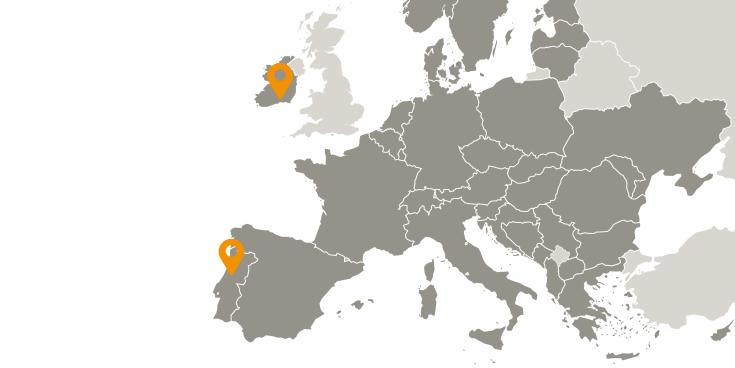Mission impossible: from Ireland to Portugal by bike? Check out the story of Mr Darren McAdam-O’Connell, the Interreg Europe project beneficiary, who cycled from Cork, Ireland, to Coimbra, Portugal.
Cycling for Change: Interreg Europe project beneficiary from Ireland meets his project partners in Portugal using only sustainable transport.
- 25 September 2024

July 2024, Dr. Darren McAdam-O’Connell, an advocate for sustainable transport from the Cork Environmental Forum, embarked on an extraordinary journey. His mission wasn’t just a physical challenge but a demonstration of his commitment to sustainability, all within the context of his work on the Interreg Europe EMBRACER project. “You can’t do one thing and say another,” he explained, emphasizing the need for those promoting sustainable solutions to experience the challenges firsthand.
Darren’s journey aimed to show that sustainable transport methods are achievable—even across international borders. Using only a combination of cycling, ferries, and public transport, he set off from Cork, taking a ferry from Rosslare to Bilbao, Spain, before making his way along Spain’s coast and then southward into Portugal.
The idea behind his journey was not only to demonstrate the viability of sustainable travel methods but also to understand the struggles of people in peripheral regions, far removed from central economic hubs, where transport can be especially challenging.
The EMBRACER project aims to improve policies that connect underserved regions with urban centres using informal transport modes like cycling, ride-hailing, and shared vehicle systems. Darren, as the coordinator of the Cork Transport & Mobility Forum, took this journey to gain firsthand insights into the accessibility issues that residents in these areas face.
Check out his testimony:
Darren's journey wasn’t without its challenges. He often encountered “hostile road infrastructure,” which he described as “scary and difficult” to navigate on a bike. Public transport, while available, wasn’t always bike-friendly, adding further complications. And when he arrived in small towns late at night, the lack of clear accommodations made the experience even more daunting.
The trip underscored the difficulties people in peripheral regions face when trying to rely on public and sustainable transport options. Darren’s main takeaway? While the systems in place might seem accessible on paper, the reality can be very different. This is particularly relevant to people who experience transport poverty or depend heavily on cars due to social isolation and limited alternatives.
He expressed that while he was able to complete the trip due to his experience and physical ability, many others wouldn’t be able to. He also pointed out that for people with disabilities, such as those in wheelchairs, the obstacles he encountered—like limited storage on public transport—would likely be even greater.
While Darren’s trip highlighted the gaps in Europe’s current transport systems, he remains hopeful. The solutions, he believes, don’t require major infrastructure investments. “Not a lot would have to be done to make it easy,” he noted, citing examples of timetable adjustments or minor modifications to existing transport facilities. For example, smoother connections between trains and ferries, more bike-friendly spaces, and flexible schedules could make a significant difference in connecting peripheral regions to the urban centers.
“Public transport has to have a low barrier to entry,” Darren said, explaining that it should be accessible to everyone, not just those familiar with how the system works. He emphasized that for public transport to truly serve people, it must be convenient and dependable.
Darren’s sustainable journey from Cork to Coimbra serves as a powerful reminder that while promoting green travel is essential, the infrastructure must be there to support it. As Europe continues to push for greener policies, Darren’s experience underscores that the solutions may lie not in sweeping changes, but in small, practical improvements that make sustainable travel accessible to all.
